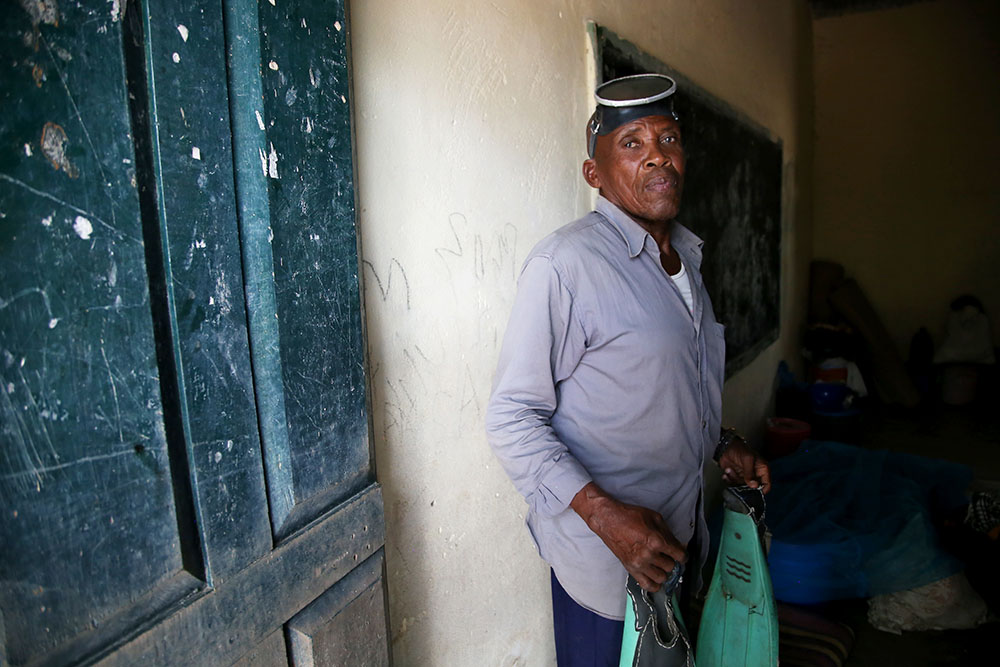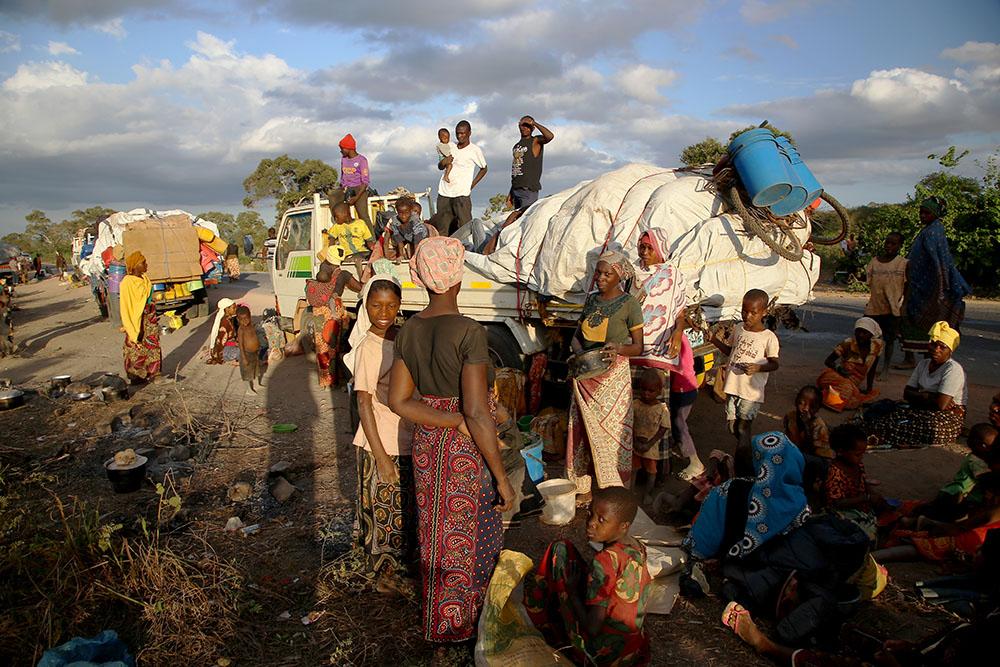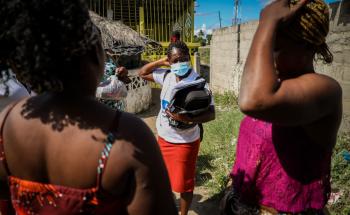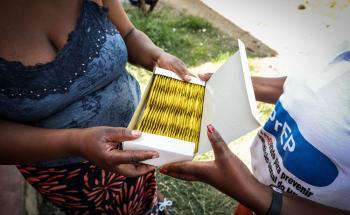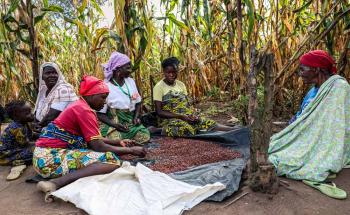Cabo Delgado, the northernmost province of Mozambique, has been suffering violent attacks from a non-state armed groups (NSAG) since 2017 that have forced hundreds of thousands of people to become internally displaced. Over 2020, the conflict escalated and in March 2021, it reached its peak when a coordinated and brutal attack took place in Palma, transforming a once busy city, home to Total’s billion-dollar gas liquification infrastructure, into a ghost town.
In recent months, the armies of Mozambique and other allied countries in the region have launched offensives regaining control of areas and cities that have been prepared or are being prepared for the population that left them to return. These offensives have at the same time dispersed non-state armed groups. While the violence is now less widespread, there are still scattered and frequent outbreaks of violence that continue to make people flee.
We share some of the testimonies of people who were displaced from different areas of Cabo Degaldo.
“I am from a village in Muidumbe district and I am 56 years old. Since July I have been living in the transit site of Nangua 2, near Metuge. My name, Maganja, means the ‘friend of friends’ in the Mwani language. We are over 1,200 families from various districts here. The latest ones to arrive are from Quissanga – they arrived after an attack took place there in September. My wife and I have eight children aged between three and 21.
They are all in the capital, Pemba, with their mum because they have to study, but things there are very expensive. That is why I live on this site. To pay their tuition fees we do temporary jobs.
We fled from the village before the attackers arrived. They started shooting in nearby towns and we escaped as best as we could. I have lost the house and the car and I have no way of getting my things back. We haven't received much support so far. The first aid distribution was this week.
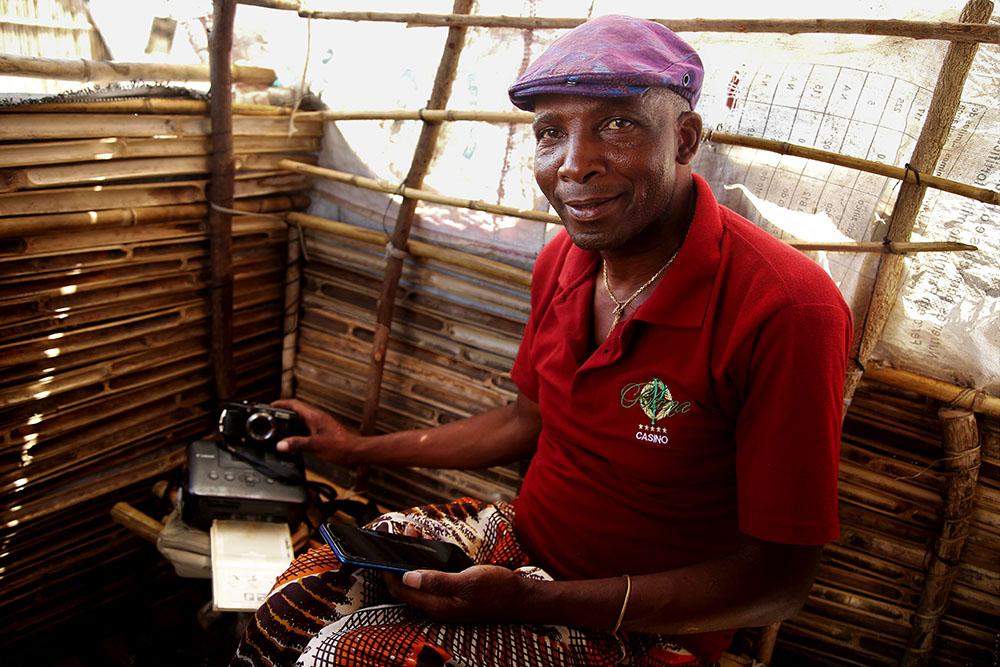
I used to work as a driver and photographer. I took photos for everyone. I have a Canon camera. I also travelled around with this little Olympus camera and a portable printer. The last photo I took was during a church function. Everything I got in life was through the work with the camera. For each photo, I charged 100 meticals [1.5 US$].
I took photos and videos of traditional ceremonies, initiation rites and other things. I also did montages and I did photos for official documents, in colour and in black and white.
Some people from my town have returned, but I don't have the money to go there, check how things are and come back again.”
I’ve lost everything I got through my photography workMaganja Vetu
“I am 32 years old. I am from a town in the Quissanga district. Violence touched my area in January 2020. Some houses were burned down. We went to hide in the forest for a while. Then things calmed down and we returned home, but in September armed men came again. My wife, who was eight months pregnant, was kidnapped and since then I have not heard from her. I have two children from my first wife who is in Montepuez. In May of this year, I arrived at the 25 de Junho resettlement site in Metuge.
Before the conflict, I worked as a technician in a water and sanitation project. In my town, everyone did something, usually what they liked. Some fished for catfish in the river, most were merchants, others were carpenters, and some had farms. We were happy.
We worked with cooperatives to produce rice, corn, sesame. From 2016 we used an irrigation system so we could grow crops during the dry season. In Mozambique we have cyclones every other year; one year the rains are good, the next they’re not and in recent years we’ve had a lot of droughts. The current climate is unpredictable.
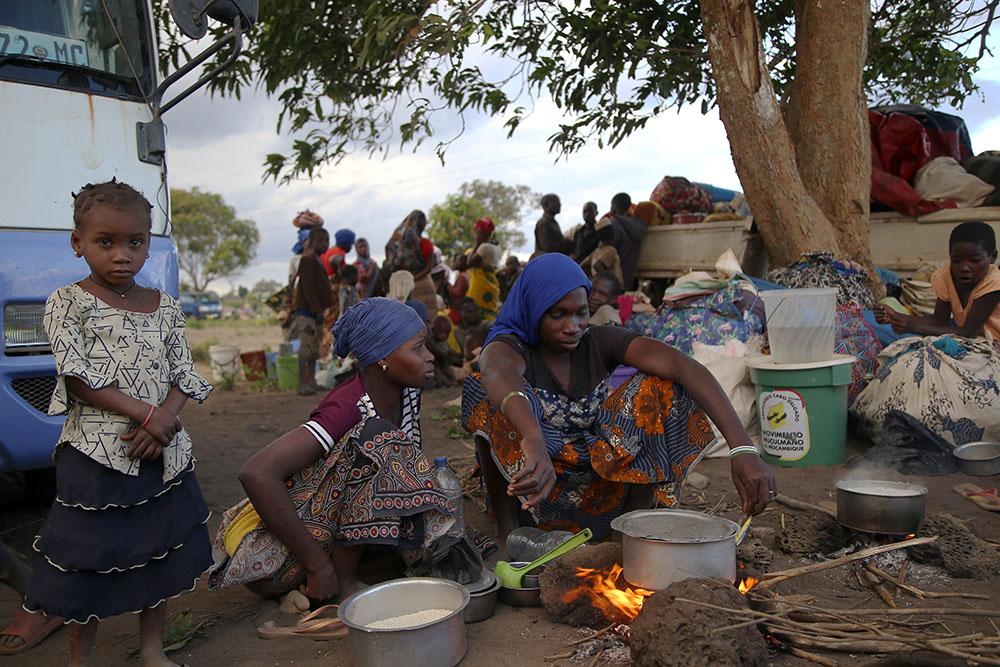
I miss many things: the life I had before, when I had a motorcycle to get around, I had a varied diet and slept in a bed. Now I sleep on the ground, like an animal. I miss being under a proper roof, and here we almost always eat rice, just rice. At least I work as a health promoter. If I was sitting at home all day it would be even worse. Most of the displaced people do nothing. You have to do something, whatever it is because without work you are worse off. Things are uncertain here: sometimes you get food, sometimes you don't.
My idea of peace is to be in harmony with the community. I have some hope. Most people want to go back, but it is not easy to do it. You need money. You might be perceived as a member of an armed group.”
I miss the life I had before when I had a motorcycle, a varied diet and I slept in a bedSamuel Alberto
“I am 58 years old and I come from the city of Mocímboa. Because of the conflict, I sought refuge in the forest and I spent a year and three months there with more than 70 other people. Life in the forest was not life, it was suffering. All we ate was dried cassava and cassava leaves, without salt and without anything. Every day was the same.
There was nothing else. When mango season came, we would eat some mangoes. We dug a well next to a stream to get groundwater. We set a trap and hunted an antelope from time to time. We ate that meat as a change from the cassava. We thank God that during all the time we were there we had no disease. Our big concern was being discovered and killed. But now we are sitting all day in the resettlement camp here in Nanili, health problems pop up.”
"Life in the forest was not life, it was suffering"
“I am 65 years old and I am from Mocímboa da Praia. I left there in March because of the conflict. There was violence over six days. Attackers killed my husband and son. They burned many houses and destroyed infrastructure. First I went to the village of Mangoma. I stayed there one day and then went to Awasse, where I stayed another day. Then we arrived at Nanili, the last village in the district.
Since April I have been in Mueda. We contacted local leaders and initially stayed at a school. Then the authorities created a resettlement site known now as Eduardo Mondlane. When I arrived here, this place was a forest. Some good people helped me to get settled. Here everyone sleeps on the floor and the roofs are not strong. I am worried they will not stand up to the rainy season.
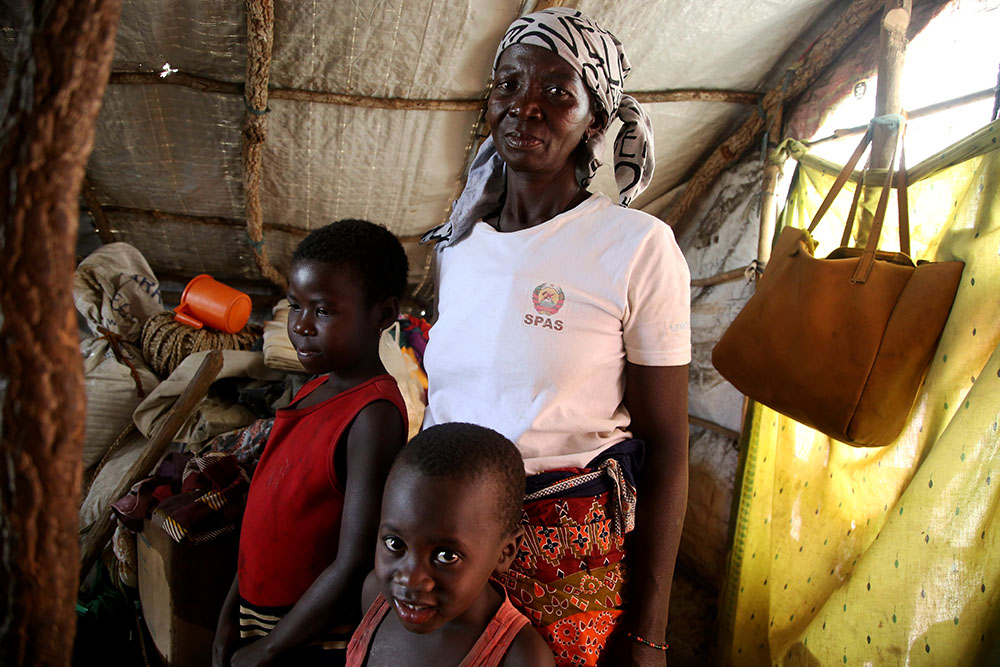
People get on well with each other in the camp, but when there are distributions, tensions arise. Thanks to a cash programme run by an NGO, some people have managed to start small businesses: some people sell sugar, others dried fish, onions or other basic products.
I have relatives spread out across Cabo Delgado. Several of my siblings and children are in Montepuez. I try to talk to them frequently. My moments of happiness here in the camp are when I play with my grandchildren.
“I am 80 years old and I am from Muambula village in Muidumbe district. I left my home in October 2020 after an attack. They broke into my poultry-yard and destroyed it. It had eight spaces with 100 chickens each. Now I have nothing. I arrived in Mueda after spending two weeks in the forest and since April of this year, I have been in the Eduardo Mondlane resettlement site.
I have eight children and five grandchildren. Some relatives went to Montepuez, others to Pemba and some even to Nampula province. Here in Mueda, I am alone with three of my grandchildren, who are three, six and nine years old. We live in a tent made of plastic sheeting, sticks and clay. The kitchen is at the entrance and we have a bathroom outside and a small garden where I plant cassava and sweet potatoes. I pick the cassava, press it and then we eat it. I haven’t lost any family members, but I have lost everything I owned and this is terrible.
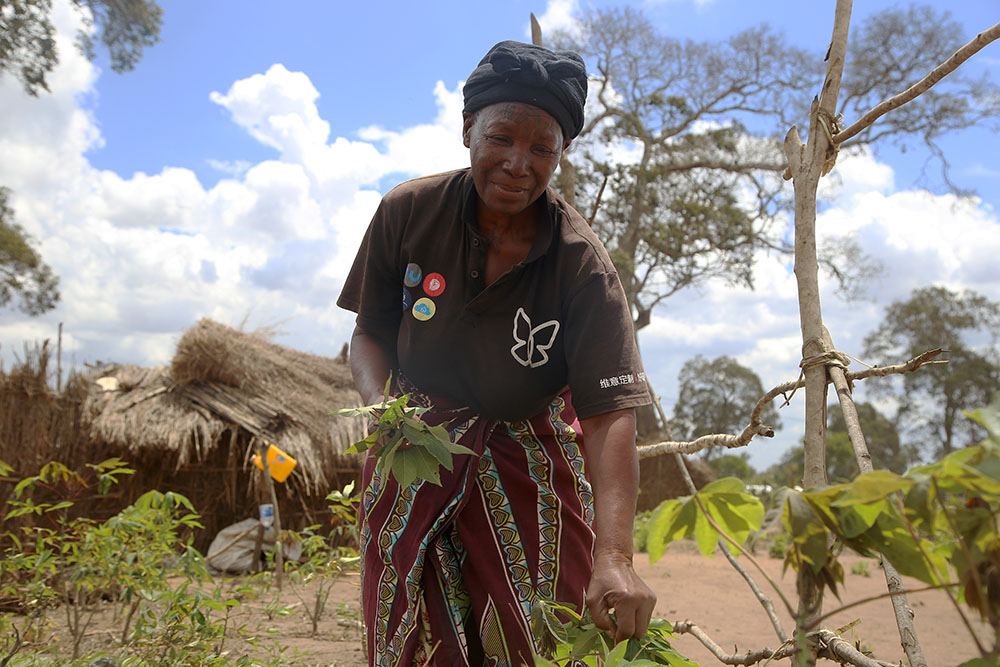
The scarification on my face is a ritual from Makonde culture. I had them done when I was 15 years old. I spent three days in a row with my face swollen and unable to eat because I had to cut my face with blades and put a pigment made out of charcoal into the wounds. Before it was commonplace, but after independence in Mozambique, it was stopped. So now we are all together.
Throughout my life, I’ve been through difficult times. During the Portuguese colonial period, many people could not study, there was a lot of discrimination and they used us to do heavy work. We were mistreated if we protested. After independence, the civil war was also tough. But this conflict we are experiencing now is worse. I don't know how it will end. In November I returned to my village one day to see how things were. I went in a van with other families. There are people who are returning home, but I am not completely reassured. We want to have peace and each one of us wants to be happy at home. Until that happens, I ask the world to please continue helping us to alleviate our situation.”
“I am 77 years old and I am from the coastal village of Marere, in the district of Mocímboa da Praia. There I farmed and I fished. I have two wives and four children. After my village was attacked in 2019, I went to the city. I spent two years there, until March. Then I fled to a village in the Palma district. I was only there for three days because then conflict broke out there too, so I went to Mandimba, in Nangade district. But violence happened again and I crossed into Tanzania. While fleeing I was hit by bullets. The attackers abandoned me in a river. A few days later I returned to Cabo Delgado and stayed in Negomano for six months.
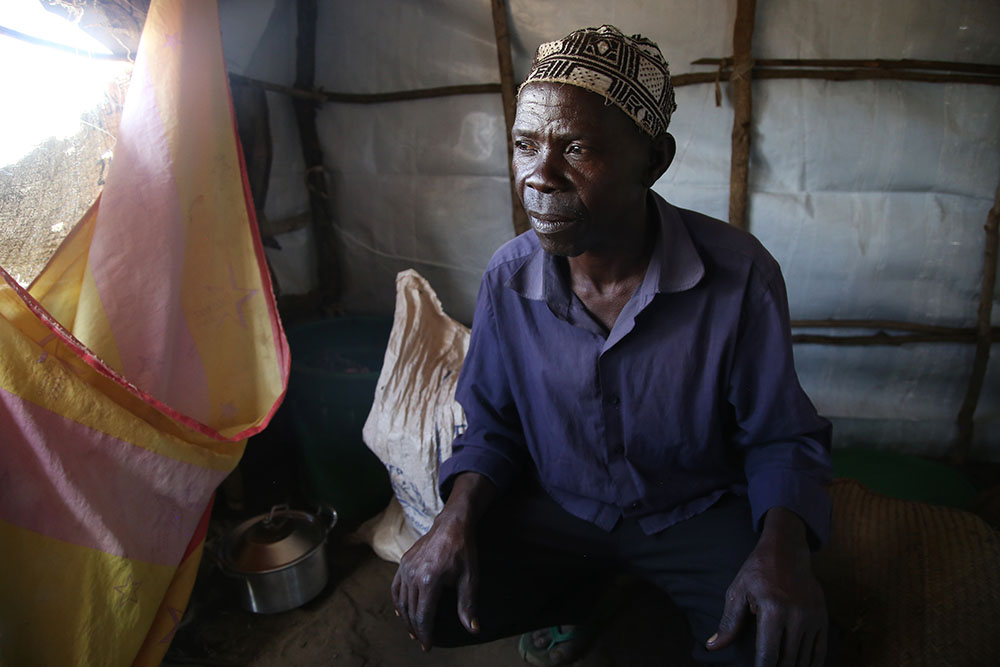
With the aid we received, I was just about able to cope. I built a house with tarpaulins and, with the kitchen utensils, oil and rice we received, we could eat for a while. At first, I had my wounds treated by MSF, then I continued the treatment in a public health centre. Although we haven’t had much food lately, I thought I was in a safe place, but in November some insurgents approached that area too.
That’s why we came to Mueda after paying 600 meticals [9.4 US$] per person for transport. I made the money by selling some food and some sleeping mats that we had made ourselves. Every time we get to a new place and we settle in and try to do something, suddenly we have to leave again. Moving from one place to another all the time makes me sad. I don't know what will happen in the future.”
“I am 38 years old and I come from a village in the Macomia district. I fled the violence in August 2020. The attack caught us asleep. After passing through a few places I ended up settling here in Nasitenge. There are about 12 of us in my family. At first, we lived in local people’s houses. The resettlement camp was set up this year. We don't have any water here. You have to walk a long way for it. When I go to fetch water I take a 20-litre bucket with me. It takes me an hour to get there, another hour to get back, and then you have to wait there… it can take all day.
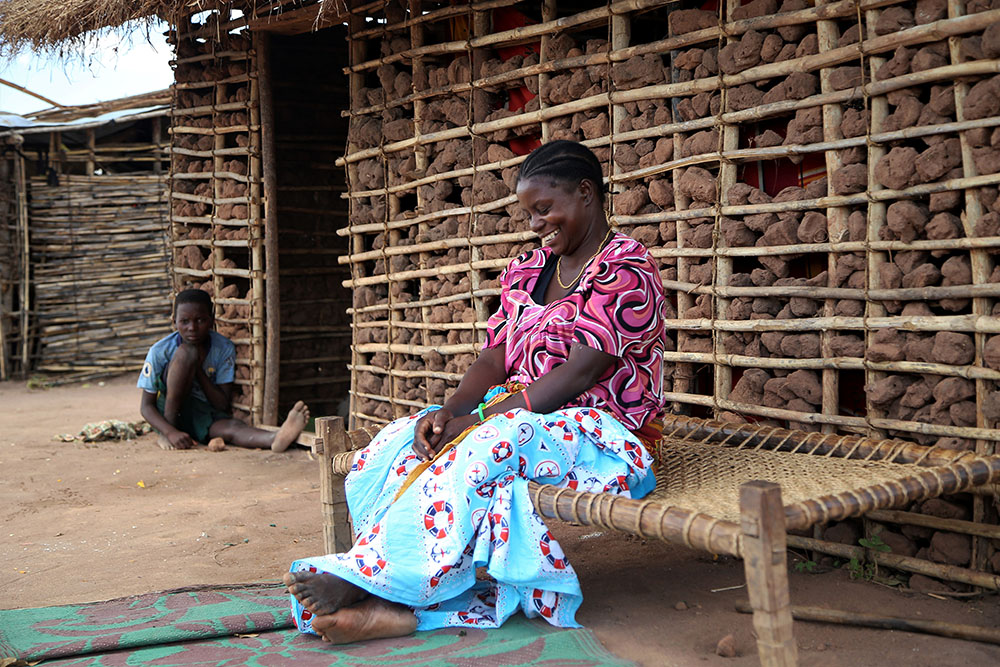
I’d like to go back home but I have no money. Now everything is dangerous. I wonder why this war does not end. We are running all the time. In mid-November, a group (of insurgents) approached Namatil and killed some people. Everyone – hundreds of families – fled from here temporarily because we were afraid. Some of us went to the forest and others to other places. All we took with us was a few buckets of water, some cooking utensils and some clothes. As we had young children with us, my group moved slowly. After a couple of days, when things calmed down, we returned to Nasitenge.”
When I left Mocímboa in October 2020, I found refuge on the island of Ibo for several months. I continued fishing as best I could until they no longer let me use the boat. I went back recently to Mocímboa to work on cleaning up parts of the city, as a lot of infrastructure and buildings have been affected. People want to live there again, but the authorities haven’t given the green light yet. That is why I came to Nanili two weeks ago, while we wait to return.
We are hungry because we haven’t received anything since we arrived. A relative transferred 500 meticals [7.8 US$] to me by phone, and with that, I have been able to get a few things. I am staying at this school. Sixty of us sleep in one of the classrooms. I brought some of my fishing kits with me – fins and snorkel and goggles. I have lost practically everything. Fishing was my life and now I don't know what to do.”
